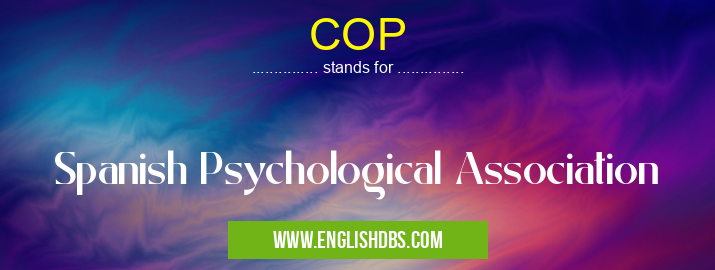What does COP mean in SOCIETIES
COP stands for Colegio Oficial de Psicólogos, which is the Official College of Psychologists in Spain. It is an organization that represents psychologists working in the country and oversees their professional qualifications and practice. The COP was founded to defend and promote the interests of the psychology profession in Spain, as well as ensure that ethical standards are maintained and upheld by professionals in the field. The mission of the COP is to help ensure public welfare through the promotion of a competent psychology profession, based on evidence-based practices, professional competence, legal safeguards, and ethical guidelines.

COP meaning in Societies in Academic & Science
COP mostly used in an acronym Societies in Category Academic & Science that means Spanish Psychological Association
Shorthand: COP,
Full Form: Spanish Psychological Association
For more information of "Spanish Psychological Association", see the section below.
Membership Criteria
In order for a psychologist to become a member of the Colegio Oficial de Psicólogos they must meet certain criteria laid out by this organization. All applicants must be Spanish citizens or residents holding appropriate immigration documents or have completed their studies within a European Union university or educational institute recognized by the Spanish government. They must also possess a valid degree obtained from one of these recognized institutions. Furthermore they must demonstrate proof of present employment that can verify any practical experience obtained prior to applying for membership.
Essential Questions and Answers on Spanish Psychological Association in "SCIENCE»SOCIETIES"
What is the Spanish Psychological Association?
The Spanish Psychological Association (COP) is a professional organization that was founded in 1967 to promote the practice of psychology and advance the interests of Spanish psychologists. It is registered with the Ministry of Education, Culture and Sport as a professional organization for psychologists, aiming to put into practice scientific knowledge related to mental health.
Who can join the COP?
Membership in the COP is open to all qualified psychologists in Spain who are committed to research, teaching, clinical practice or any other field related to mental health. It also offers associate membership for those interested in the goals and objectives of the association, such as students and professionals from other disciplines related to psychology.
What benefits do members of COP receive?
Members of COP have access to a range of benefits including discounts on publications, events and conferences, access to local groups and networks for support and mentorship opportunities, free job updates on available positions in psychology-related fields across Spain. Additionally, members can get exclusive discounts in specialized stores selling psychological materials and services.
What kinds of activities does COP organize?
COP organizes a variety of activities such as workshops, seminars, special courses, symposiums and international congresses which are aimed at enhancing academic excellence in psychology-related topics both within Spain and worldwide. It also publishes various magazines devoted exclusively to psychological issues as well as an official journal that disseminates refined research results from around Europe.
Is there any requirement for joining COP?
In order to become a member of COP one must meet certain requirements depending upon the type of membership chosen; For regular membership one must be licensed by a public body in Spain with authorization for professing psychology; Associate members must show proof that they are studying or working under direction by a regular member; Guests must submit proof they are studying or working outside of Spain but keep having their residence inside it; And finally Friends must show evidence they follow psychological activities without gaining economic benefits from it.
Does COP offer accreditation programs?
Yes, COP offers specialized accreditation programs depending on different areas within psychology such as Clinical Psychology, Neuropsychology among others. These programs require applicants demonstrating knowledge as well as experience on relevant topics before being certified by specialists provided by the association itself.
How often does COP host conferences?
Every year, COP hosts several conferences mainly focusing on current trends both within national borders but also internationally regarding topics related to psychology. The frequency increases during summer months where more sessions might be opened up around Europe regarding specific topics that might gather thousands of participants at once
Final Words:
In conclusion, COP stands for Colegio Oficial de Psicólogos which is an official college of psychologists located within Spain that works both professionally within this nation as well as internationally promoting psychosocial research and educational opportunities - offering services such as international internships or workshops designed for members’ personal development - aimed towards advancing psychological practice while still adhering in accordance with established regulations formulated additionally by the organization itself.
COP also stands for: |
|
| All stands for COP |
